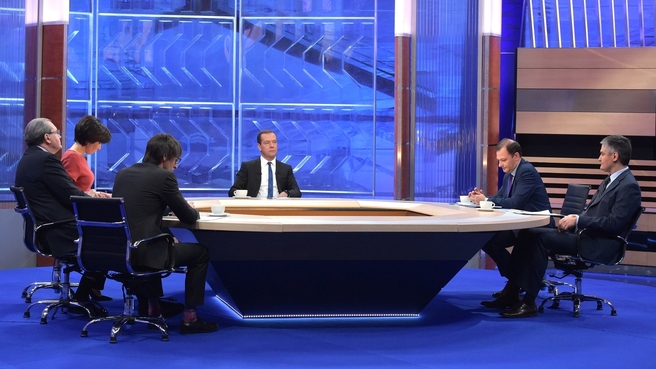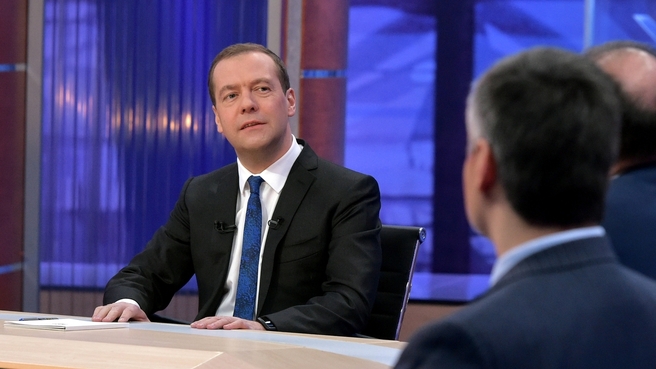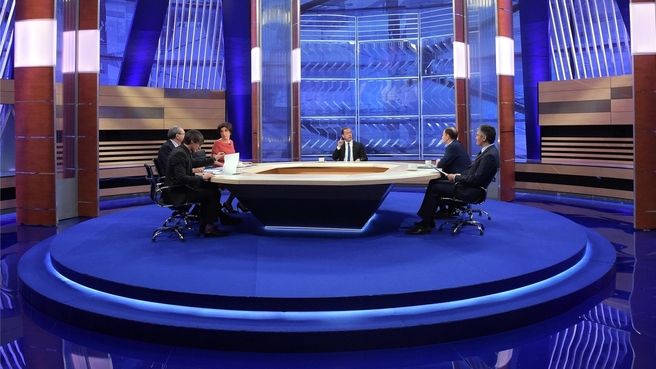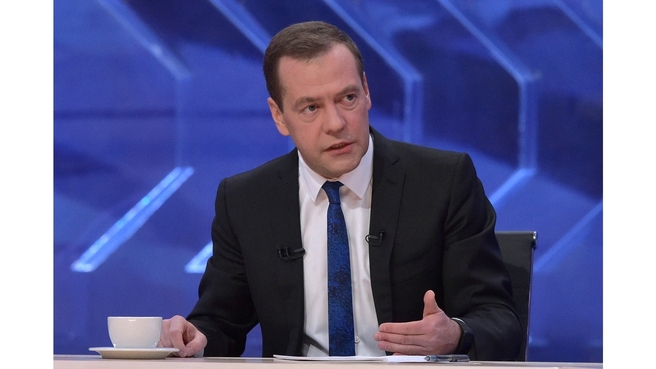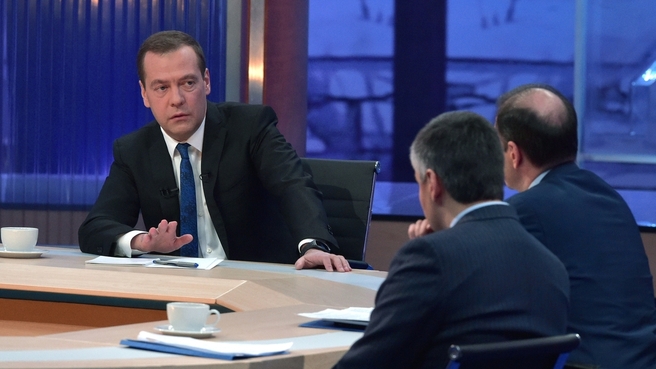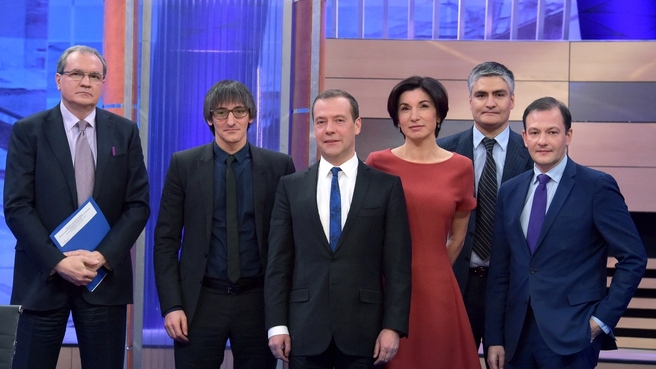The Prime Minister answered questions from TV anchors Valery Fadeyev (Channel One), Sergei Brilyov (Rossiya), Elmar Murtazayev (RBC), Irada Zeinalova (NTV) and Mikhail Fishman (TV Rain).
Excerpts from the transcript:
Annual results
In Conversation with Dmitry Medvedev: Interview with five television channels
Dmitry Medvedev: Speaking about the socioeconomic situation, the most important point is that we are developing. Despite current external restrictions and domestic problems, we have maintained macroeconomic stability, we are meeting all social obligations, paying wages and pensions; and we are moving forward in education and healthcare. This is the most important result of socioeconomic development in these rather difficult economic circumstances.
As for macroeconomic indicators, this year GDP will have declined slightly, by just under one percent, maybe even half a percent. But by next year already, all economic indicators will start going up.
Retrospective
-
In Conversation with Dmitry Medvedev: Interview with five television channels, 9 December 2015
-
In Conversation with Dmitry Medvedev: Interview with five television channels, 10 December 2014
-
In Conversation with Dmitry Medvedev: Interview with five television channels, 6 December 2013
-
In Conversation with Dmitry Medvedev: Interview with five television channels, 7 December 2012
This is not an easy task but it is possible. To succeed, our economy must grow faster than the global economy. We need qualitative changes in our economy, and they will happen if we grow faster than the rest of the world.
Recently we have been trying to take decisions aimed at restructuring our economy. The pressure that has been placed on our economy, including sanctions, the denial of access to the loan market and a number of other problems, such as plummeting energy prices, oil prices and subsequently gas prices, have forced us to address economic restructuring more energetically.
The inflation rate was around 14 percent last year, but we have cut it to 5.8 percent this year, which is the lowest rate in our history.
In the past few years, our agriculture industry has been growing by 3 percent annually despite the general economic decline. This year we have gathered a huge crop harvest of 118 million tonnes. It is the largest harvest in modern Russian history, and this has allowed us to deal with domestic problems while increasing our export capacity and strengthening our positions in international markets.
Over the past two years alone, we have invested some 250 billion roubles in industrial import substitution. As a result, we have boosted growth in several important industries, such as the chemical, wood processing and pulp and paper industries. This year they will report impressive growth of 10 to 15 percent.
The changes in our pharmaceutical industry are very important. Only recently, our country fully depended on imported medicines. But now our companies manufacture between 65 and 70 percent of medicines on the domestic market, supplying quality pharmaceuticals.
Positive changes have been registered in metallurgy, construction materials and several other industries.
Social policy
Social spending is our absolute priority. It is fully protected from any sequestration or cuts. All this is in the budget, and we will carry it out.
Prices are growing significantly slower this year.
We are expanding the healthcare budget. While this year’s budget amounts to almost 2.6 trillion roubles, next year it will be around 3 trillion. We plan to reach 3.15 trillion roubles and 3.25 trillion roubles in 2018 and 2019, respectively.
Only eight or ten years ago, there were hardly any perinatal centres in our country. Now they have opened in every Russia’s region. Back in 2006 and 2007, our doctors performed only 60,000 advanced medical procedures every year, including stenting and complicated cancer surgeries. Now the number of such procedures is approaching one million. Moreover, they are available not only in Moscow or St Petersburg, but at other new clinics across the country.
Military spending
The consolidated budget of the Russian Federation, regions and municipalities is equally divided between education, healthcare and military spending (primarily, the expenditures of the Defence Ministry). Each component has a share of 23 to 24 percent.
Our people appreciate that the situation in our country is stable, its borders are secure and we are not experiencing any events similar to what is happening in the Middle East and sometimes even in Europe. All this is directly dependent on spending to ensure our defence capacity and security.
We currently export $17 billion worth of arms, and eventually, our arms exports may reach $20 billion. We remain one of the largest arms suppliers in the world. Our only competitor is the United States.
Taxes
We have preserved the flat tax rate. Moreover, we have not changed our tax system at all.
We believe that it is better when everyone pays taxes instead of hiding in the shadows. It cannot be ruled out that we will again consider changes at some point, but amending the income tax is not on our current agenda.
Privatisation of Rosneft and Bashneft
These enormous recent deals were very complicated and took us long to prepare.
If Rosneft had not offered the best price for Bashneft, the deal would not have gone forward. We simultaneously discussed the importance of a bigger deal, the sale of a 19.5 percent stake in Rosneft, designed to solve serious budget problems.
Rosneft itself was searching for a buyer for its stake. Eventually, the deal went through in the form that has been made public. Before that, we discussed the possibility of selling the stake to our Japanese partners, to certain Middle Eastern funds, and European and South Korean companies showed interest in it, too. The attraction of the offer made by Glencore and the Qatari fund lay in the fact that they were willing to sign it quickly, to provide the required amount of liquid assets and do it fast, and to transfer the money to the Russian budget. This is why we have done it. These are very effective solutions. As a result, we have received more funds from these two deals (including the purchase of Bashneft) than we planned and have transferred over one trillion roubles to the budget.
Doping
Question: The second part of the McLaren report, which came out last week, says that we have a state system of doping support, even though the President has said that all involved must be punished severely. This does not interest Mr McLaren. Names are pouring out. WADA will name everyone they consider guilty. Bobsledding and skeleton championships have been called off in Sochi already. How is the investigation going? Will we be able to prove our innocence and return to high-level sport?
Dmitry Medvedev: Our opinion of doping is absolutely the same as in all other nations. We think it is unacceptable in sport, and must be taboo. However, we ought to understand what constitutes doping. Even WADA standards classify the use of some substances as doping but not others. Everyone knows the meldonium story. Heart medications of a similar kind with chemical formulas close to it, which are produced in Anglo-Saxon countries, were not blacklisted for some reason while this medication invented in the Soviet Union was. This arouses doubt, putting it mildly.
So we need an absolutely explicit and legally fool-proof definition of doping. More than that, every athlete must be able to obtain information at any time on what does and does not constitute doping so that there can be no excuse later that we didn’t know. On the other hand, the athlete and, even more importantly, his coach and doctor must be informed of the medications he is taking. So our positions coincide here. We have taken actions, and will take more, to rid Russian sport of doping. There really are problems in Russian sport, just as in other countries. This is our common challenge.
The trouble is that the anti-doping campaign has turned into an anti-Russian one. We heard hints at many levels that it will be used against us, considering the general political situation around Russia.
Are there grounds to reproach us? Of course there are. Are there grounds for reproaching other countries? There are. However, this campaign has been launched only against our athletes and our country. At first, many of our athletes were barred from participating in the summer Olympics in Rio – but we did well, despite everything.
Then came the decision, which I regard as immoral and unacceptable, not to admit our team to the Paralympics. That went beyond good and evil. Paralympic athletes have disabilities, some of them very serious. They require medications for their entire lives – and we are told that these people took some prohibited substances. We see quite clearly that this was competition by other means, because our Paralympic team was objectively the best and the strongest in character, too. I find the decision downright immoral.
So it goes from bad to worse – all kinds of reports, part 1 then part 2. I see it as part of a larger anti-Russian campaign. Naturally, there was no state system of doping support, there is none now, and there can be none. This does not mean that no coaches and athletes were involved in doping, but it is absurd to allege that the Government is mixed up in it.
We will continue to fight doping but everyone should realise that decisions against the Russian Federation concerning athletic competitions or some athletes are not always meant to fight doping.
The latest decision to call off the bobsledding and skeleton championship in Sochi came from the international federation. The question arises, first, why it has been done now, right after the report. Was the atmosphere any different before? They keep referring to some atmosphere. Second, what has atmosphere to do with it? There is an agreement connecting our federation and the International Bobsleigh and Skeleton Federation, which stipulates reciprocal duties. Such agreements should discuss responsibility, but I have checked that agreement and it does not envisage serious responsibility. I think we should revise all our agreements with all institutions that organise competitions so that these agreements detail the signatories’ explicit obligations. In this instance, before cancelling an agreement, the other party should think about how we have incurred expenses, so it may need to prepare for losses.
Question: There is a huge scandal, nevertheless, but Vitaly Mutko, the minister who is the face of it worldwide, including in our country, has been promoted to deputy prime minister. Why?
Dmitry Medvedev: Vitaly Mutko is in fact Deputy Prime Minister now but not Minister of Sport. All questions addressed to him by persons whose legal status is vague to me (like Mr McLaren – I am not sure to this day what he is), nothing has come of all these questions and answers to them. Look at the latest published report. The man says he is absolutely sure that Mr Mutko is involved in the doping controversy but explains a few minutes later that he has no proof. Just what is going on here? We have no proof that, say, Minister Mutko is involved. If there were proof, he would not be in the Government now. However, some people responsible for doping, deputy ministers among them, have been dismissed.
Last but not least, the Investigative Committee is looking into who used doping and what kind. Let us wait for the results. These will be legally valid conclusions, rather than conjecture by people of vague legal status who level ungrounded accusations at other countries’ officials.
Sanctions
Question: The foodstuffs market in Russia has been growing robustly, partly because it was protected from imports for a while. That was our response to the anti-Russia sanctions. We can now see the positive impact of such countermeasures. However, the impact is not always good. Where do you think these sanctions will go from here? They are still a bad thing, even so.
Dmitry Medvedev: The sanctions are bad for everyone. Those who imposed the sanctions have ultimately triggered a reaction and created problems. And it was not us. At some point, our partners decided for some reason that with the sanctions, it would be possible to persuade Russia to change its stance on certain issues again.
This is not the first time Western countries have made these decisions in relation to the Soviet Union or Russia, but they never gained anything. However, for Russia, this created a new situation we quickly turned to our advantage – agricultural production and import substitution. Still, overall, the sanctions are not a normal situation. They still affect the interests of both Russian and Western companies, and hit a number of countries fairly hard. True, we have expanded the market and boosted food security for a large number of foodstuffs. We are confident that Russia will be able to cover 100 percent of its needs on the market in the coming years. But some of the neighboring economies have contracted for this reason. Take the Baltic countries, where GDP fell by 1-1.5 percent due to Russia’s counter-sanctions. I visited Finland recently; they are also suffering losses because of this situation. So it is certainly not a good story. It is high time we ended it. Yet, many Russian manufacturers – both in industry and agriculture – are asking the President and Government to keep the counter-sanctions. Let me emphasise: we introduced them as a response to Western sanctions, but even more so to spur our own economic development. We are keeping them for now. But everyone should be prepared that sooner or later this will come to an end and competition will intensify again. At this point, it is necessary to develop agriculture and industry to the point where they will be comparable in viability to Western industry and agriculture.
Russia-US relations
Question: Although it would probably be naïve to expect Russia-US relations under Trump to become absolutely positive, there is still the feeling that there will be more common sense. You were the one who launched the reset policy with Obama, and we all know how it went. In your opinion, in what areas did Russia and the US fall short in their efforts? How would normal economic cooperation with the United States look now, especially since it is so desperately needed in our bilateral relations?
Dmitry Medvedev: We believe that our US partners are to blame for the deterioration in our relations. We were not the ones who wanted this. It is true that some prerequisites were in place, and remain relevant, but the foundation that was created was to a large extent destroyed.
Russia’s cooperation with the United States will always consist of two dimensions. The first dimension represents areas in which we depend on each other, where we are partners by default, and there is no getting away from this partnership. This is international security. We are the two major nuclear powers and permanent members of the UN Security Council, vested with fundamental responsibility to maintain peace on the planet. We have the capability for this and are ready to do so. In this regard, consultations never stopped and will continue in the future, which is absolutely normal. This refers to all issues, including strategic parity, nuclear deterrence and local conflicts like Syria. This also goes for discussing key global issues within the United Nations, etc. We keep in touch on these issues no matter what.
As for the second dimension, which is the economy, we do not necessarily need to be partners in this area and can live without each other. The question is whether it needs to be this way.
Russia’s trade volumes with the United States have never been all that high. Theirs is the largest global economy, but our trade never exceeded $25 billion – $30 billion, while trade turnover with Germany exceeds this amount by several times. I am not even talking about trade with China and other countries. In other words, there has never been anything special in this respect.
That said, trade relations also continue to decline. This year, trade is expected to total $17 billion - $18 billion, which is a very small amount for either of our economies. Yes, there are still some projects. Many business people like to talk about taking part in various joint ventures in Russia and achieving new objectives. However, this depends to a large extent on the administration.
As for the policy the new administration chooses to adopt, I do not know. Many things voiced by President-elect Donald Trump are pragmatic and hence reasonable. After all, he is not saying that Russia is a friend or that we want some kind of a special friendship. What he says is that he wants to promote the pragmatic interests of the United States, the US does not want to be enemies with anyone and wants to develop relations with everyone. These are the right things to say for any national leader. This is what Russia has been saying all along. In fact, the decisions Russia takes are not taken for the sake of the US, China or anybody else, but for the sake of our national interests. It is in our national interests to put our relations back on track. The problem is that a president-elect can never start from the ground up, and always faces the situation that exists. There are traditions, there is the Department of State, there are decisions adopted by Congress, the Senate. In other words, all these factors will affect the future policy of the new administration. Of course, what Russia wants are stable, normal, forward-looking relations with the United States, just as President Putin has said on numerous occasions.
Question: Trump has nominated Rex Tillerson for Secretary of State. He received the Russian Order of Friendship for cooperating with Russia, while Elon Musk was appointed an advisor today. These people seem to be more like strong capitalism-oriented managers than politicians. Have you met them on the sidelines of international summits? Do you know what to expect from them?
Dmitry Medvedev: Regarding people from the business world, and Mr Tillerson is part of this world, these are very pragmatic people. I believe this to be a very good thing. What happened in the US? I do not know how it will play out, but their head of state has virtually no experience in public service. All his life he worked on economic and business development. And he brings similar people on board. I believe that what matters the most in this respect is that these people are free from innate stereotypes against Russia or against anybody else. They all tend to start from a blank sheet. I believe this to be a good thing. We all know Mr Tillerson as a major businessman, a person with extensive experience in joint projects, including on Sakhalin, and in a number of other deals. It is for this reason that he was awarded the Russian Order of Friendship.
